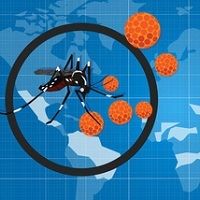Zika Mystery Case in Utah Stumps CDC
An elderly Utah man who died last month with a massive Zika infection contracted the virus through travel. But how did his caretaker acquire it?

Utah is not a Zika-affected zone, and it doesn't have the right kind of mosquitos to harbor the virus, so investigators from the US Centers for Disease Control and Prevention are mystified by a Zika case in a family caregiver who was nursing an elderly man who had Zika infection.
The CDC has dispatched an emergency response team to Utah to try to learn what happened, and to aid local officials in carrying out any necessary preventive measures should it determine there is a wider Zika threat.
A major concern is that the case could indicate that Zika can spread from one person to another without a sexual contact or the help of a mosquito.
The deceased man had a rampant case of viral infection, with viral loads 100,000 times above the typical infection's rate. Utah health officials said the man contracted Zika through travel but likely died of other health problems. He died in June.
The CDC has ruled out sexual contact as a possible source and also doubts that the caregiver had been bitten by an infected mosquito since the species of mosquito that carries Zika (Aedes aegypti) has not been found in Utah.
Nor had the caregiver been to a Zika zone.
Discussing the case, CDC director Thomas Frieden, MD said "We don't have any evidence that suggests Zika can be passed from one person to another by sneezing or coughing or sharing utensils," but that this case could challenge that belief.
Needle stick injury has been suggested as a possibility, and the dead mans relatives are being tested for Zika infection, officials have said.
There are about 1,300 confirmed cases of Zika in the US, the CDC says, though that number is likely only a small fraction of the total cases. The virus, linked to microcephaly in infants exposed in utero, usually causes only a mild illness so most cases are believed to go unreported.
The CDC in April said that there were at least 200 pregnant women known to have the Zika virus in the US. Pregnant women are the most likely demographic to seek testing due to the associated risk of birth anomalies.